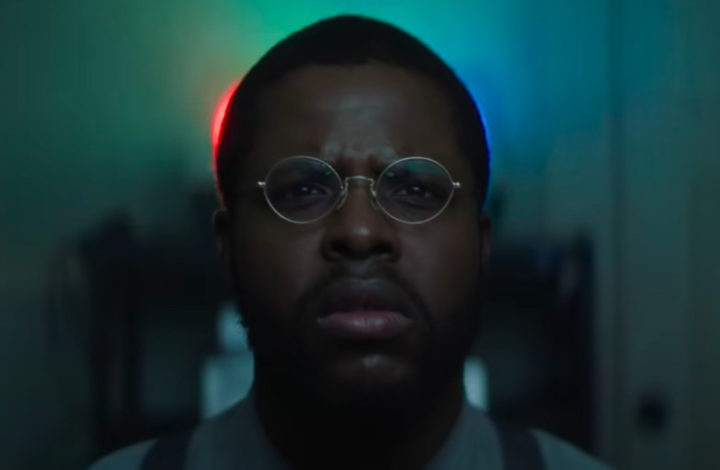
MPAA Rating: R | Rating: ★★★★½
Release year: 2021
Genre: Drama, Fantasy, Spiritual Director: Edson Oda
Over the past year—the final year of my PhD studies—I’ve been applying for jobs: academic jobs, pastoral ministry jobs, film criticism jobs, editorial jobs. It’s an emotionally vulnerable process not unlike dating in that you have to put yourself out there over and over and over again in the hopes that this job will finally be the right fit, will be “the one.” Except in this dating relationship, you have very little power or control over the outcome—you can present your accomplishments and experiences while hoping and praying that they will pick you, all the while knowing that there are perhaps dozens, if not hundreds, of other qualified candidates also competing for the same job (actually, it’s more like being a contestant on The Bachelor than real-life dating). When you don’t get the position, it’s deeply disappointing; when this rejection occurs 50+ times, it can lead towards despair. But if you do miraculously get an interview, then another interview, then finally the job you were hoping and praying for, well…the feeling is like being born anew. It provides a trajectory going somewhere rather than nowhere.
I share with you my personal circumstances because I am still wrestling with why writer-director Edson Oda’s fantastic Nine Days moved me so profoundly. From its opening moments to its closing scene, I was on the brink of tears and often openly weeping; not out of sadness, per se, but simply by the waves of emotions—both positive and negative—that swept over me over the course of the film’s two hour running time. Though I am often emotional while watching movies, this was a disarming experience, especially for a seasoned cinephile and film critic. Like some of the characters within Nine Days, I was wholly caught up in the artificial-yet-true reality presented by the moving images. It was a delightful surprise, as if I had discovered something new about cinema as well as something new about myself. Nine Days is a film about life, a film about film, a film about God. That it is Oda’s first feature film is a remarkable testament to his unique directorial vision and talent—this is a filmmaker whose cinematic art I will be eagerly anticipating for years to come.
Nine Days is a work of magical realism, a fantasy film with a down-to-earth tone; as philosopher Paul Ricoeur puts it in his description of the genre of parable, this is “the fantastic of the everyday.” A quiet man, Will (Winston Duke), lives alone in an old-fashioned house in the middle of a desolate desert landscape. He sits on a couch and watches old cathode-ray tube television sets stacked atop one another as a wall of screens. As we soon discover, each screen presents a first-person POV shot from a living individual somewhere on Earth, and Will’s job is to observe and record their lives. Though the metaphysics of this realm are unclear—is this an afterlife? Is there a God?—Will serves as a guardian angel of sorts, a caretaker of the souls entrusted to him. So when one of these human lives abruptly and violently ends, it’s Will’s duty to find and choose a new candidate out of a collective of pre-existing personified souls who are applying to live as human beings. This isn’t reincarnation exactly, but rather a creative interpretation of Plato’s metaphysics regarding the human soul and memory presented in the form of a compelling existential fable. These are souls applying for the job to be born.
Nine Days‘ high-concept premise elicits inevitable comparisons to Japanese filmmaker Hirokazu Koreeda’s masterpiece, After Life, a similar quietly humanistic work of cinematic beauty. Where After Life presents an afterlife way station where recently-deceased souls choose their happiest memory to define their post-mortem eternity, Nine Days is a prelife film, a story about beginnings, not endings—the souls we see auditioning for Will and his colleague, Kyo (Benedict Wong), are seeking the wonder of experiencing Being-in-the-world. As Will tells the souls, “you are being considered for the amazing opportunity of life.” Candidates include the neurotic Mike (David Rysdahl), the laid-back Alexander (Tony Hale), the romantic Maria (Arianna Ortiz), the intense Kane (Bill Skarsgård), and the beautiful free-spirited Emma (Zazie Beetz). Each has the eponymous nine days to make it through the interview process, to convince the skeptical and aloof Will that they have what it takes to be alive.
Like a good parable, Nine Days is simultaneously familiar and evocative, inspiring and disequilibrating. I was not at all surprised as to which soul was finally left standing next to Will, and yet I was entirely taken aback by the film’s outstanding coda. Winston Duke is utterly remarkable—he was so good playing boisterous characters in Black Panther and Us, yet he gives such a subtle, powerful embodied performance here as Will. Beetz and Wong are equally compelling, and the complex range of emotions and interactions on display are evidence of the film’s richly humanistic themes. The cinematography, set design, and beautiful score all come together to create an authentic and generative “spiritual’ world. Nine Days is precisely the kind of film that you ought to watch with friends or family in order to discuss it afterwards together, as I imagine different people will pick up on the multitude of themes and ideas this film explores and generates. It invites contemplation and attention, both to the filmic world it presents as well as the wider “real” world we each inhabit. Indeed, Nine Days is an invitation to give our full attention to the wonders of this world. And as Simone Weil once wrote, attention, taken to its highest degree, is the same thing as prayer.
IMDB Listing: https://www.imdb.com/title/tt10451852/
Leave a Reply